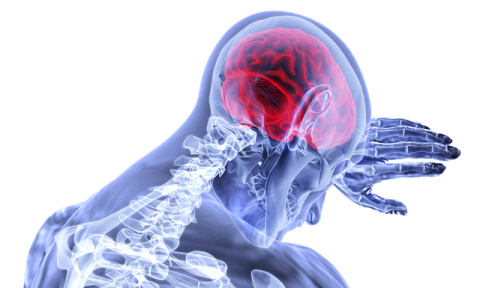News • Coronavirus
Asian ethnicity strongly linked to COVID-related stroke
Asian ethnicity is strongly linked to COVID-related stroke, reveals an analysis of stroke centre activity in England and Scotland during the first wave of the coronavirus pandemic, and accepted for publication in the Journal of Neurology Neurosurgery & Psychiatry.

Among patients with ischaemic stroke, which is caused by a blocked artery, nearly 1 in 5 (20%) of those with COVID-19 infection when they had their stroke were Asian--more than twice the proportion seen in ischaemic stroke patients without COVID-19.
Ischaemic strokes were also more extensive and severe, and more likely to result in greater disability and death, when associated with COVID-19, the findings indicate.
Previous research has suggested that COVID-19 infection might make the blood stickier and so more liable to clot, so potentially boosting the risk of a stroke, but this finding has been undermined by the poor quality of the evidence to date and the reliance on comparisons with historical stroke data.
To obtain a clearer real-time picture of the potential impact of COVID-19 on stroke risk, the researchers collected data for 1470 strokes among patients admitted to 13 hospitals between March and July this year, during the first wave of the coronavirus pandemic.
During this period, there were 86 strokes in patients with evidence of COVID-19 at the time: 81 of these strokes were ischaemic (caused by blocked blood vessels); the remainder were intracerebral haemorrhages (caused by burst blood vessels).
Evidence of infection was determined by a positive coronavirus test within 4 days of admission or suspected COVID-19 at the time of admission and confirmed on testing at any point during the subsequent 10 days.
The features of these ‘COVID’ strokes were compared with 1384 (1193 ischaemic and 191 intracerebral) among patients admitted during the same time period, but with no evidence of COVID-19.
Ethnicity was recorded in 86% of COVID cases and 78% of non-COVID cases. Among patients with ischaemic stroke nearly 1 in 5 (19%) of those with COVID-19 infection when they had their stroke were Asian--more than twice the proportion seen in ischaemic stroke patients without COVID-19 (7%).
This rate was higher than that seen in people of Afro-Caribbean ethnicity. *Lead study author, Dr Richard Perry, comments: “Our study suggests that COVID-19 has had more impact on strokes in the Asian community than in other ethnic groups. We cannot say from our data whether this is because Asians are more likely to catch COVID-19, but it seems unlikely that this is the sole explanation. “Evidence from Public Health England suggests that, in the UK, people of Afro-Caribbean origin are at the highest risk of catching COVID-19, whereas those of Asian descent have only a marginally higher risk than White people. We suspect, therefore, that Asian people who contract COVID-19 may have a higher risk of COVID-19-associated stroke than is seen in other ethnic groups.”
Ischaemic strokes in COVID patients were around twice as likely to be caused by the blockage of more than one large blood vessel in the brain (18% vs 8%), and to be more severe, with an average stroke severity (NIHSS) score of 8 vs 5. Levels of D-dimers, a protein marker for the stickiness of blood, were also higher in COVID-19-related strokes than in other strokes.
Ischaemic strokes in COVID-19 patients were associated with more severe disability on discharge--average disability score of 4 (out of a possible 6)--and death while in hospital (20% vs 10%), even after accounting for other influential risk factors.
In the 45 COVID patients who had had an ischaemic stroke, and for whom both dates were recorded, cardinal COVID-19 symptoms occurred an average of 6 days before the stroke.
Among the 3 patients who had a brain bleed, and for whom both dates were recorded, COVID-19 symptoms occurred an average of 4 days after the stroke. Although the numbers are small, this difference is significant, say the researchers.
They found no evidence to back up previous suggestions that SARS-CoV-2, the virus responsible for COVID-19 infection, is associated with younger age or male sex in stroke patients.
The researchers acknowledge that a major limitation of their study was that they were only able to report investigations done as part of routine clinical care. But they included patients from 13 centres across the UK, so it may be more representative than existing studies from a single hospital system or city, they suggest. “These findings...confirm that COVID-19 has an important influence over the onset, characteristics and outcome of acute ischaemic stroke,” they write. How the virus exerts its influence is still unclear, but one single factor is unlikely to be responsible, they explain.
“We suggest that COVID-19 may provoke the onset of an ischaemic stroke through a variety of thrombotic [clot forming] and inflammatory mechanisms, promoting generation of thrombus [blood clot] in the heart or large vessels or via small vessel occlusion [blockage],” they write. “Which of these mechanisms manifests in a given patient may be determined by that individual’s conventional vascular risk factors, such as atrial fibrillation [abnormal heart beat], large vessel atheroma [artery narrowing], hypertension [high blood pressure] or type 2 diabetes mellitus.”
And they conclude: “Our study provides the most compelling evidence yet that COVID-19-associated ischaemic strokes are more severe and more likely to result in severe disability or death, although the outlook is not quite as bleak as previous studies have suggested.”
Source: The BMJ
06.11.2020





